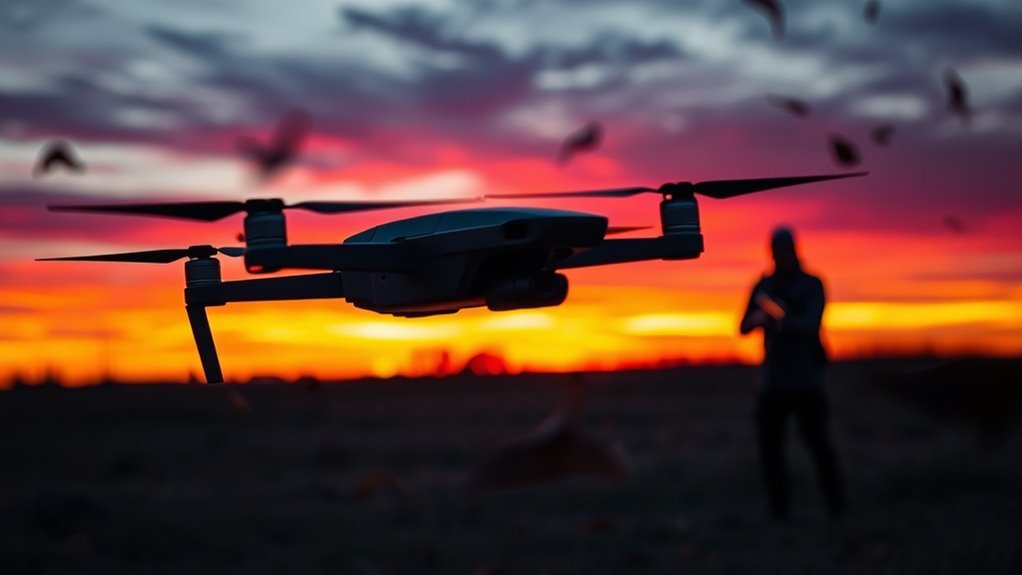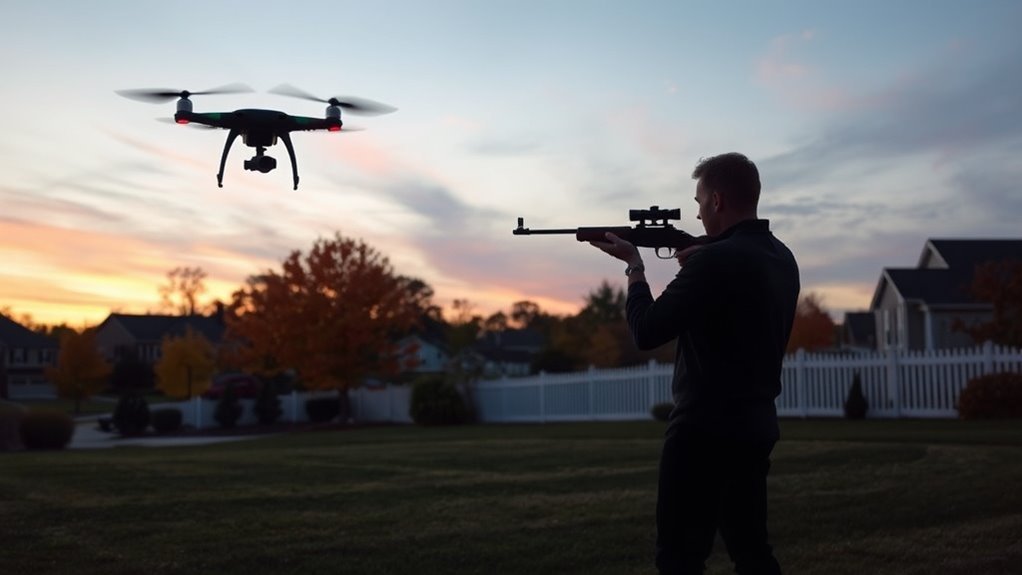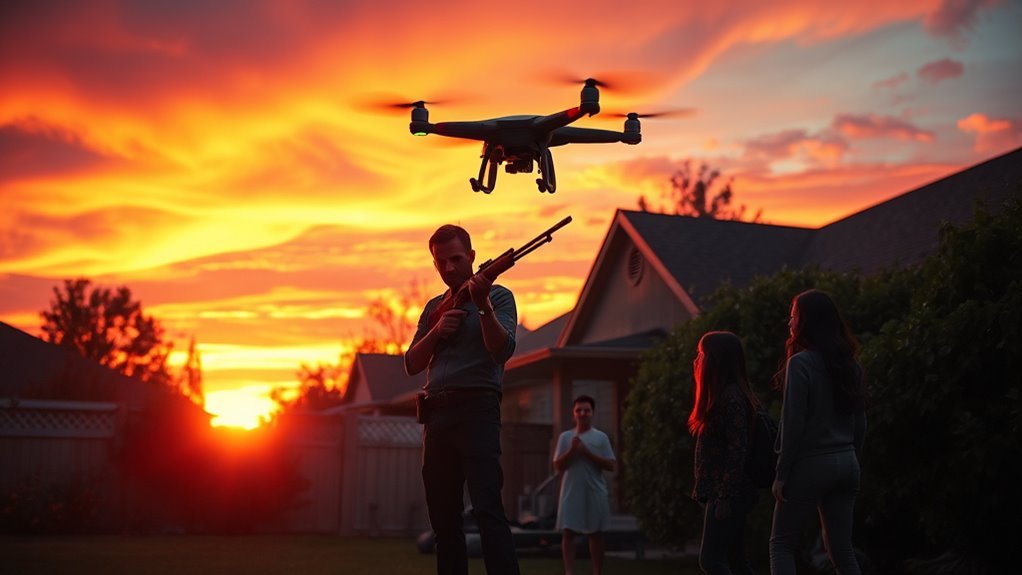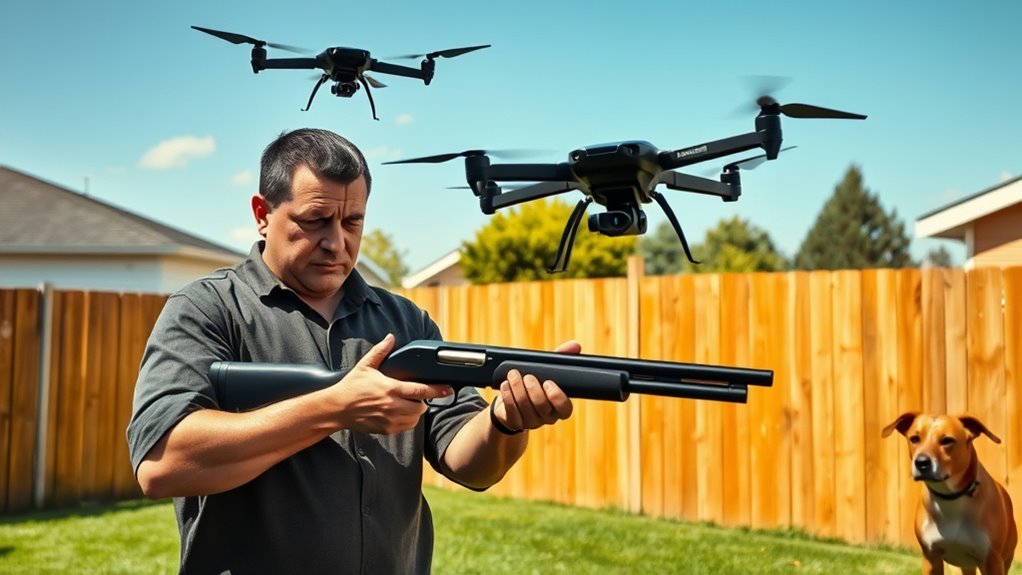It’s illegal to shoot down a drone, and doing so can lead to serious legal consequences, including fines and potential jail time. Your property rights don’t extend into the federally controlled airspace above you, meaning you have limited options for addressing unwanted drones. Self-defense claims are often complicated, as courts require clear evidence of a threat. To better understand your rights and explore lawful alternatives, you might want to contemplate further implications and solutions.
Understanding Drone Regulations

Although drone technology has advanced rapidly, understanding the regulations surrounding their use is essential for both operators and those affected by their presence. The Federal Aviation Administration (FAA) enforces strict guidelines for airspace management, ensuring that drones operate safely alongside manned aircraft. Familiarizing yourself with these regulations isn’t just about compliance; it’s about preserving the freedoms we cherish. For instance, knowing where you can and can’t fly can prevent conflicts and enhance public safety. Additionally, as drone usage grows, so does the need for responsible operation. Engaging with local laws and respecting no-fly zones empowers you to use your drone while protecting your rights and those of others. Ultimately, informed operators contribute to a harmonious integration of drone technology into our skies, while being mindful of local drone regulations. In addition, understanding the stability during windy conditions of various drones can help operators make safer decisions in less favorable weather.
Property Rights and Airspace

Is It Illegal to Shoot Down a Drone?
Property Rights and Airspace
Understanding drone regulations is only part of the picture; property rights and airspace also play significant roles in the ongoing debate about drone usage. When you consider airspace ownership, it’s essential to recognize that property boundaries extend vertically. While you may own the land beneath, the airspace above is often subject to federal control, leaving you with limited rights. This creates a complex scenario where your desire for privacy and control clashes with the legal frameworks governing airspace. Drones can hover over your property, potentially infringing on your sense of autonomy. As you navigate these issues, understanding the nuances of property rights and airspace is vital to advocating for your freedoms while recognizing the broader implications of drone technology and regulation. Additionally, the legal consequences of shooting down a drone can lead to serious repercussions, making it essential to consider lawful alternatives.
Legal Consequences of Shooting Down a Drone

While you might feel justified in shooting down a drone that invades your privacy, the legal consequences of such an action can be severe. Many states have drone vandalism laws that classify shooting down a drone as a criminal offense, potentially leading to hefty fines or even jail time. Furthermore, claiming self-defense can be tricky; courts often scrutinize whether the drone posed an imminent threat. If you can’t prove that your safety was genuinely at risk, your self-defense claim may not hold water. It’s essential to understand that taking matters into your own hands could lead to significant legal repercussions rather than the freedom you seek. Exploring lawful alternatives could be a more prudent approach to addressing privacy violations.
Alternative Solutions to Drone Encroachments
Drone encroachments can feel invasive, but there are several alternative solutions that prioritize both privacy and legality. To protect your space, consider implementing drone deterrents such as signal jammers or net systems. These tools can disrupt a drone’s operation without causing harm, aligning with legal standards. Additionally, reinforcing privacy measures like installing privacy screens or planting tall shrubs can deter drones from intruding on your property. Understanding line of sight requirements is crucial for recognizing how drones operate in your area. Educating your neighbors about drone awareness can foster a community approach to addressing these encroachments. Engaging with local authorities to advocate for better regulations can also create a safer environment. By using these alternatives, you can assert your rights while respecting the laws governing drone usage. Implementing strategies that enhance payload management can also help in understanding the capabilities and limitations of drones in your vicinity.
Case Studies and Legal Precedents
As legal discussions around drone usage evolve, examining case studies and legal precedents becomes essential for grasping the complexities of shooting down drones. The intersection of drone trespassing and self-defense laws presents unique challenges and considerations. Here are three notable cases to explore:
- State v. Smith (2018): A property owner shot down a drone hovering over his backyard, citing invasion of privacy. The court ruled in favor of the property owner, establishing a precedent for drone trespassing.
- Federal Aviation Administration (FAA) Regulations: The FAA maintains strict guidelines on aerial space usage, complicating self-defense claims against drones.
- People v. Thompson (2021): This case involved a defendant asserting self-defense against an allegedly aggressive drone; the court ultimately dismissed the claim, emphasizing the need for clear evidence of threat. Furthermore, the court highlighted that shooting a drone can lead to criminal charges under federal statutes concerning aircraft interference.
Frequently Asked Questions
Can I Shoot Down a Drone if It Invades My Privacy?
You might feel justified in defending your privacy against a drone, but shooting it down could lead to serious legal consequences. Understanding drone privacy laws is essential before taking any action that could escalate the situation.
What Should I Do if a Drone Is Bothering My Pets?
If a drone’s bothering your pets, consider observing its behavior first. Is it intrusive or simply curious? Prioritize pet safety by documenting occurrences, contacting local authorities, and exploring legal options for peaceful resolution.
Are There Any Exceptions for Shooting Down Drones During Emergencies?
In emergencies, legal defenses might exist, but you must follow emergency protocols. Engaging with a drone could lead to legal consequences, so understanding your rights and local laws is essential before taking any action.
How Can I Report a Drone That Violates My Privacy?
So, you’re feeling watched by a drone, huh? To report it, check local drone regulations and privacy laws. File a complaint with authorities, ensuring you provide details about the drone’s behavior and location for effective action.
What Defines a Drone as a Nuisance Under the Law?
A drone’s considered a nuisance under the law when it violates drone regulations, disrupts your peace, or invades privacy. Nuisance criteria often include frequency of operation and proximity to people or properties.

